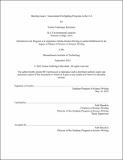| dc.contributor.advisor | Mnookin, Seth | |
| dc.contributor.author | Foehringer Merchant, Emma | |
| dc.date.accessioned | 2023-01-20T15:31:06Z | |
| dc.date.available | 2023-01-20T15:31:06Z | |
| dc.date.issued | 2022-09 | |
| dc.date.submitted | 2022-08-29T15:17:51.003Z | |
| dc.identifier.uri | https://hdl.handle.net/1721.1/147599 | |
| dc.description.abstract | There are at least 15 states in the U.S. that use incarcerated people to fight wildland fires: Arizona, California, Colorado, Georgia, Idaho, Montana, Nevada, New Mexico, North Carolina, Oregon, South Dakota, Tennessee, Virginia, Washington, and Wyoming. This thesis outlines the broad adoption and ad-hoc nature of these programs, as well as the wide variation in data available about their operation. Though incarcerated men and women have been fighting fires in the U.S. for decades, many of these programs have received very little public scrutiny.
The impacts of climate change, such as drought and warmer temperatures, have increased the likelihood of wildfires and the portion of the year when those fires are likely to spark. As climate change intensifies and the costs of disasters increase -- in 1990, the U.S. spent $390 million fighting wildfires and in 2021, the nation spent $2.3 billion -- the U.S. will have a growing need for firefighting labor. Meanwhile, the federal government is struggling to hire enough firefighters to meet the demand. Though numerous variables contribute to the creation, maintenance, and size of incarcerated firefighting programs, increasing and more dangerous fire activity could push states to consider using this labor more often. That makes it essential to understand the scope of these programs as well as their ultimate effect on participants. | |
| dc.publisher | Massachusetts Institute of Technology | |
| dc.rights | In Copyright - Educational Use Permitted | |
| dc.rights | Copyright retained by author(s) | |
| dc.rights.uri | https://rightsstatements.org/page/InC-EDU/1.0/ | |
| dc.title | 'Burning Issues': Incarcerated Firefighting Programs in the U.S. | |
| dc.type | Thesis | |
| dc.description.degree | S.M. | |
| dc.contributor.department | Massachusetts Institute of Technology. Program in Comparative Media Studies/Writing | |
| dc.contributor.department | Massachusetts Institute of Technology. Graduate Program in Science Writing | |
| mit.thesis.degree | Master | |
| thesis.degree.name | Master of Science in Science Writing | |
